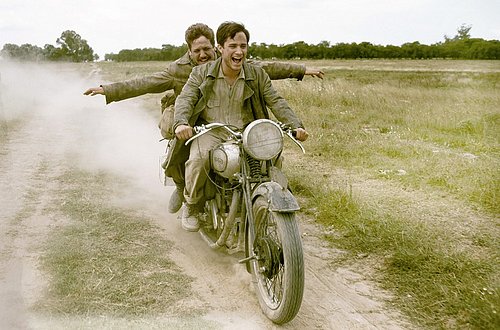
For the last six years I’ve heard nothing but raves about the on-the-road, buddy film, political manifesto “The Motorcycles Diaries,” but for some reason or other I never got around to watching it. Until the other night, and I am here to add to that chorus and raves and recommend it as one of the great films of the past 25 years.
The truth is, after viewing it, I can’t get this film out of my head; from the gorgeous images that showcase the intense beauty of South America, the passionate camaraderie and love between a 23 year old Che Guevara and his hilarious, sidekick, best friend Alberto Granado, to the gradual political and social transformation of Ernesto “Che” Guevara as he encounters the poor, indigenous people who populate his home in the southern hemisphere. I recommend it not because the cinematography is gorgeous (it is) or because the actors are tremendous (they are) or because it’s a really fun road trip that will make you want to hit the road yourself (it will). I recommend it because like all great art, it will change you, or at least the way you see this part of the world.

“The Motorcycle Diaries” is set in 1952 and is based on the actual diaries kept by Che Guevara, who was then a medical student one semester away from graduating when he decided to go on a long journey up and down that long continent of South America with his friend, biochemist Alberto Granada. Before they go, the two amigos trace out an outline of their journey which they plan to mount atop Alberto’s outdated Norton 500 motorcycle, nicknamed by Alberto “The Mighty One.”
The two men, their bodies, sacks and packs of food and other provisions, are perched like a tremendous behemoth upon this tiny motor bike. And even though their eventual destination is a leper colony in Peru, where they hope to help the sick and dying, these are two young men looking to discover new places and the fun and adventure that is sure to greet them along their intended 8,000 kilometer (5,000 mile route).
They hop aboard “The Mighty One” and head out from Buenos Aires, Argentina across the flatland and up into the Andes and through its snow covered mountains, down the coast of Chile and across the Atacama Desert, where eventually “The Mighty One” breaks down and is sold as scrap. You want to give God a laugh, it is said, tell him your plans.

The tone of the film shifts slowly from one of rambunctious hilarity to something different with serious sociopolitical implications. In their travels, Che and Alberto encounter a group of traveling migrants on the road to Venezuela, and Che (or “Fuser”, as Alberto has earlier nicknamed him) begins to get to know the peasants and downtrodden people of South America. Listening to their stories at night alongside a campfire and under moonlit skies, we see the slow metamorphosis that is happening within Che, as he hears these sad stories of lives lived under the terrible hardship of poverty. One couple tells of how their lives were uprooted and ruined because of their communist beliefs, as many of the others nod in political solidarity.
Finally, when Che and Alberto visit a copper mine, Guevara’s frustration and anger come to a boiling point as he sees with his own eyes the terrible treatment of the men who are merely trying to seek out enough money to feed their families. All this time, Che feverishly documents in a diary consisting of numerous notebooks exactly what he is witnessing and does not want to forget.

For most of the film, Alberto serves as somewhat of a foil, a source of comic relief versus the more serious and gentlemanly young Che. Alberto wants to sing, dance, drink wine and make love. Che seems more interested in learning as much as he can about a world he never knew existed. But both men are moved tremendously and muse both politically and philosophically when they reach the most breathtaking stop on their already transformative journey, the Peruvian ruins of Machu Picchu.

As Che and Alberto both observe with disgust the contrast between this centuries old ruin of Machu Picchu with the the ugly, polluted city of Lima to the south, they find themselves wondering aloud how such beauty and majesty can be so devastatingly destroyed into the waste and greed and avarice they see far below them.

Che speaks of dreams of revolution against rampant capitalism, but is warned by the more practical Alberto who answers, “A revolution without guns? It will never work.” Prophetic words indeed. In the end, the two weary travelers reach their final destination, the leper colony where Che cares for those in dire need of medical attention, refusing the custom of wearing medical gloves, and instead bravely, nobly choosing instead to meet the lepers with his bare hands.
As the film comes to a close, Ernesto “Che” Guevara makes a birthday toast, his first real political statement, in which he confirms how he has been so radically changed and hints at what those changes will mean for his future. In an attempt to put words into action of one day bridging the widening gap between the “haves” of the world and “have-nots,” Che plunges into the dangerous Amazon river and swims from the safe side where the caretakers live and eat over to the sick side, where the lepers are dying. He emerges from the water, a man newly baptized by the water and ready to begin a new, more radical life.
This is a film which will have a powerful effect on you. It will change you in many ways, not the least of which might be the way you think of Ernesto “Che” Guevara, a true man of the people.










